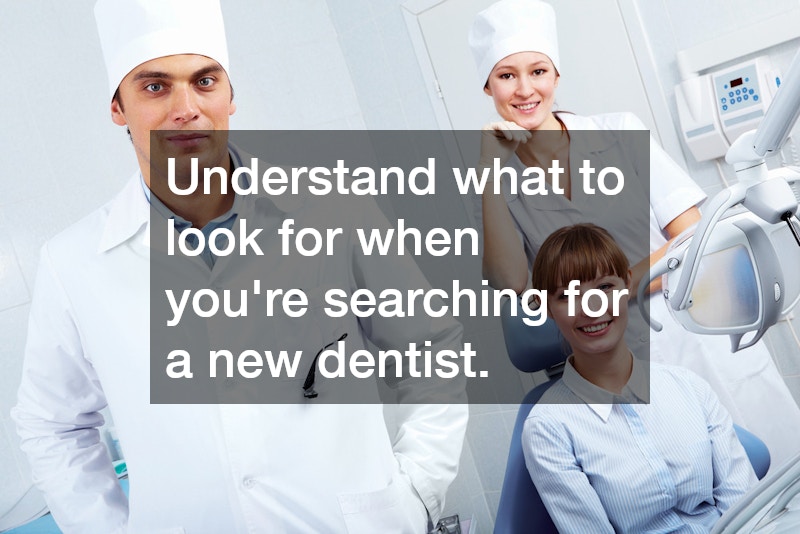
Choosing the right dentist plays a vital role in maintaining both your oral health and your overall well-being. A great dentist not only provides quality dental care but also ensures that you feel comfortable and confident during every visit. With so many dental professionals to choose from, it can be difficult to know what to prioritize when searching for a new dentist.
This guide outlines the most important factors to consider, including qualifications, location, convenience, and available services, to help you make an informed decision.
What Qualifications and Experience Should I Look for in a Dentist?
When selecting a new dentist, it is essential to confirm that they possess the proper qualifications and experience to provide high-quality care. A knowledgeable and skilled dental professional ensures that your treatment is both safe and effective.
Educational Background and Certifications
Start by reviewing a dentist’s educational background. A reliable dentist should hold a Doctor of Dental Surgery (DDS) or Doctor of Dental Medicine (DMD) degree from an accredited dental school. These credentials confirm that they have completed the necessary training in oral anatomy, dental procedures, and patient care. Additionally, some dentists pursue postgraduate education in specialized areas such as orthodontics, periodontics, or pediatric dentistry.
Licensing is another important factor. Your dentist should be licensed to practice in your state, which guarantees they have met all professional and ethical requirements set by the state dental board.
Years of Practice and Specializations
Experience often translates to expertise. A dentist who has practiced for several years typically has handled a variety of dental conditions and procedures. While newer dentists may bring fresh perspectives and updated techniques, experienced practitioners have the advantage of extensive hands-on knowledge. If you have specific dental needs, such as cosmetic treatments, dental implants, or children’s dental care, look for a dentist with experience in those areas.
Professional Affiliations and Memberships
Membership in professional organizations demonstrates a dentist’s commitment to ongoing learning and adherence to ethical standards. Look for affiliations with groups such as the American Dental Association (ADA), the Academy of General Dentistry (AGD), or state and regional dental societies. These memberships indicate that the dentist stays informed about industry developments and best practices.
Reputation and Patient Reviews
Patient reviews can provide valuable insight into a dentist’s professionalism, chairside manner, and office environment. Check online platforms such as Google, Yelp, or health-focused review sites for feedback. Look for recurring themes in reviews, such as punctuality, cleanliness, friendliness, and quality of care. Recommendations from family, friends, or coworkers can also be useful in finding trustworthy dental professionals.
Continuing Education and Training
The field of dentistry is constantly evolving with new technologies and techniques. Dentists who participate in continuing education show a commitment to maintaining high standards of care. Ask your prospective dentist how they stay current with industry advancements, whether through courses, seminars, or specialized training.
How Important Is Location and Convenience When Choosing a Dentist?
Practical considerations like location and office accessibility play a major role in ensuring you maintain regular dental visits. Convenience often determines how easily you can stick to your oral health routine.
Proximity to Home or Work
A dental office that is close to your home, workplace, or your child’s school makes it easier to attend appointments on time and reduces stress. Choosing a conveniently located dentist encourages consistent visits and makes it simpler to schedule cleanings and follow-ups.
Office Hours and Availability
Your dentist’s office hours should align with your schedule. Some dental practices offer early morning, evening, or weekend appointments, which can be helpful for working professionals or families. Also, confirm how far in advance you need to book appointments and whether they offer same-day visits for urgent concerns.
Emergency Services and Accessibility
Dental emergencies such as broken teeth or severe toothaches can occur unexpectedly. A good dental office should provide emergency care or have protocols for after-hours treatment. Ask how the practice handles urgent dental issues and whether they can accommodate last-minute visits.
Accessibility is also crucial. If you or a family member has mobility concerns, ensure that the office is equipped with ramps, elevators, or accessible restrooms.
Parking and Public Transportation Options
Consider how easy it is to reach the office. If you drive, check for on-site or nearby parking. If you rely on public transportation, make sure the location is accessible by bus, subway, or other local transit options. Convenience in travel can make your visits more manageable and less stressful.
Telehealth and Virtual Consultation Availability
Some dental offices now offer virtual consultations for preliminary assessments or follow-up discussions. This can be a convenient option if you have a busy schedule or prefer to consult with your dentist remotely before scheduling an in-person appointment. Virtual options can also help patients who need to discuss treatment plans, insurance questions, or second opinions.
What Services Should a Good Dental Practice Offer?
A high-quality dental office provides comprehensive care that addresses both preventive and restorative needs. Understanding the range of services offered helps ensure your dentist can meet your current and future dental goals.
Preventive Dentistry
Preventive care is the foundation of good oral health. Regular checkups, cleanings, fluoride treatments, and sealants help prevent cavities, gum disease, and other issues. A good dental practice focuses on education and empowers patients with tools to maintain proper home care routines.
Restorative and Cosmetic Services
In addition to preventive care, a reputable dentist should offer restorative treatments such as fillings, crowns, bridges, and implants. Cosmetic dentistry options like teeth whitening, veneers, and bonding can help improve the appearance of your smile. Choosing a dentist who provides a range of services ensures that you can receive consistent care without needing to visit multiple specialists.
Pediatric Dentistry
If you have children, finding a dentist who offers pediatric care is essential. Pediatric dentists or family practices that treat patients of all ages can make dental visits easier and more convenient for your entire household. Look for practices that focus on creating a friendly, comforting environment for children.
Orthodontic Options
Orthodontic care is not limited to teenagers. Many adults now seek alignment treatments such as traditional braces or Invisalign. A dental office that offers orthodontic options provides more flexibility for patients who want to improve both the function and aesthetics of their smile.
Advanced Technology and Techniques
Modern dental technology enhances accuracy, comfort, and treatment outcomes. Ask whether your dentist uses digital X-rays, intraoral cameras, laser dentistry, or 3D imaging systems. These tools allow for more precise diagnoses and efficient treatments. A practice that invests in advanced equipment shows a commitment to high-quality, patient-centered care.
Conclusion
Finding a new dentist is an important decision that impacts your long-term oral health and comfort. By evaluating factors such as qualifications, experience, reputation, convenience, and available services, you can choose a dental practice that meets your specific needs. Remember to consider both practical aspects, like location and emergency care, as well as professional qualities, such as education and patient communication. With careful research and attention to detail, you can find a trusted dentist who supports your journey toward a healthier, more confident smile.

